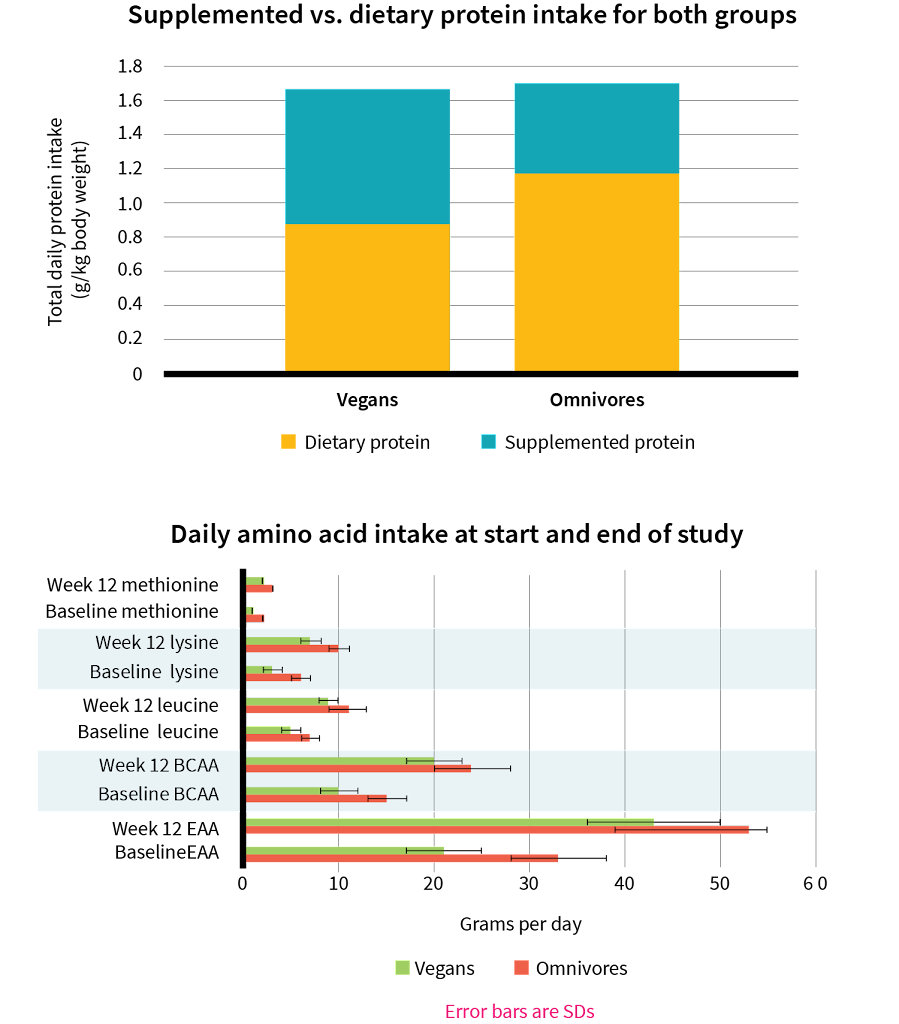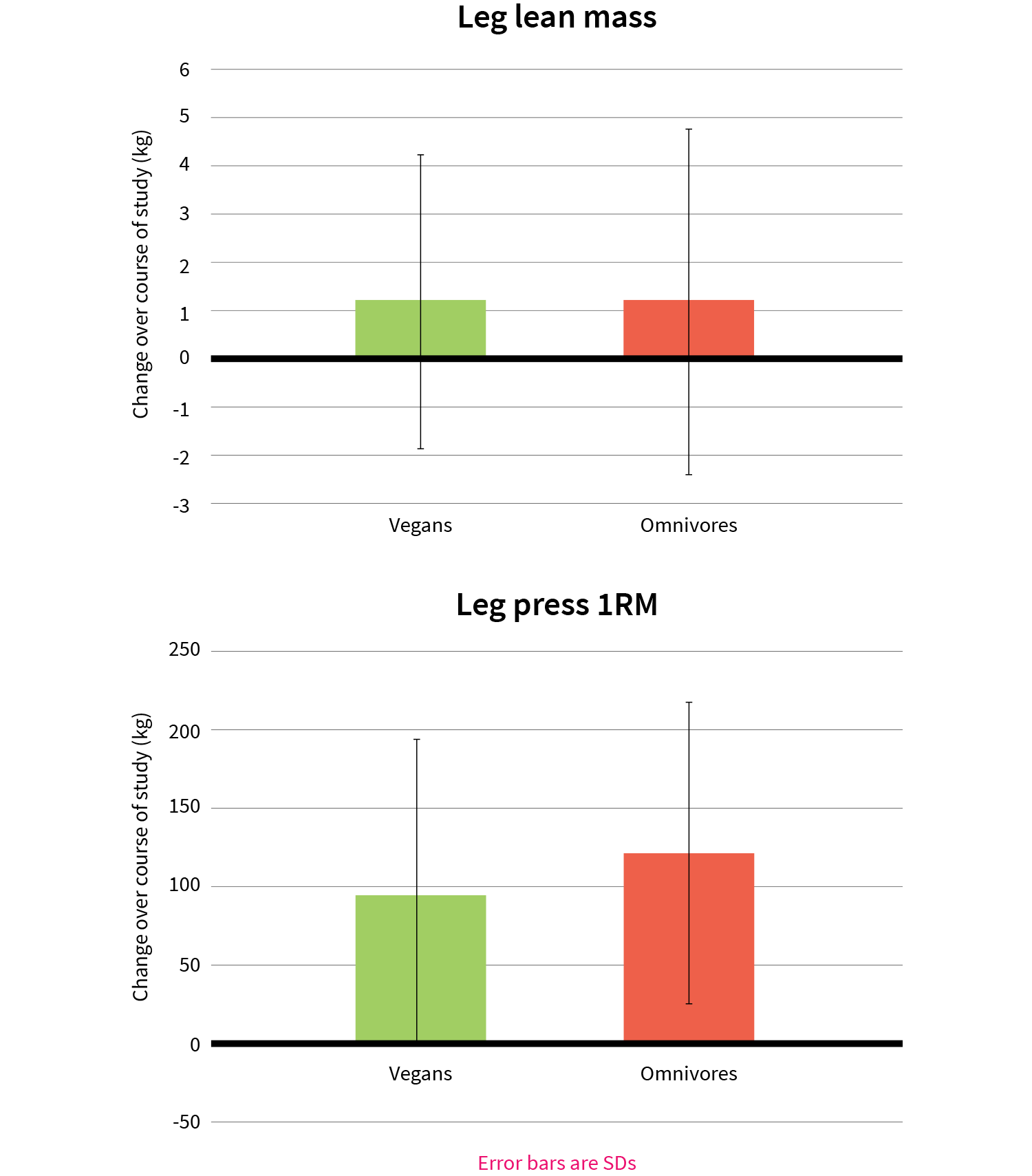Which Of The Following Is Least Abundant In Animal Protein?
Don't miss out on the latest diet and supplement enquiry
Enter your e-mail and nosotros'll keep yous on elevation of the latest nutrition enquiry, supplement myths, and more than.
Study under review: High-Poly peptide Plant-Based Diet Versus a Protein-Matched Omnivorous Diet to Back up Resistance Training Adaptations: A Comparison Between Habitual Vegans and Omnivores
You are reading a costless Examine article. Become a Member to get total access to all our manufactures and stay on top of the latest enquiry.
Quick Takes
What was the question? When controlled for protein intake, are vegan diets inherently inferior to omnivorous diets for edifice muscle in the context of a resistance practise program?
How was it answered? Researchers conducted a protein-matched non-randomized, non-placebo controlled parallel-grouping study.
Who was studied? Physically active immature men without a history of resistance training who had been following habitually vegan (North=19) or omnivore (N=19) poly peptide-adequate (more than 0.8 grams per kilogram of body weight) diets for at least a year made upwardly the participant population.
What was the intervention? Both the vegans and omnivores consumed 1.vi grams per kilogram of body weight (g/kg) of total daily protein while post-obit a 12-week resistance training program. After measuring baseline intake, vegan participants supplemented up to 1.six g/kg of total protein intake daily using supplemental soy poly peptide, while omnivores were given supplemental whey poly peptide to ensure a 1.vi g/kg full daily protein intake.
What's the primary takeaway? Both groups experienced similar gains in muscle mass and forcefulness. There were no pregnant differences between the groups.
Any caveats? This was a relatively modest study and may not take had plenty participants to notice big differences. High protein intakes were accomplished via protein supplementation, which might be more difficult for vegans in the existent earth relying largely or entirely on food sources. Also, these results may non extend to dissimilar populations, similar resistance-trained men or women.
What was the question?
Are vegan diets inherently inferior to omnivorous diets, assuming identical dietary protein content, for building muscle while following a resistance do programme?
Why was the question worth asking?
Changes in muscle mass are thought [ane] to be produced past the residue between muscle protein synthesis (MPS) and musculus protein breakdown (MPB). Resistance exercise and dietary protein both increase MPS, but the MPS response to dietary protein has been shown to depend, among other things [2], on the amino acid composition of the source being ingested. In this regard, the most of import amino acids for stimulating MPS are essential amino acids [3] (EAA). Unlike their "non-essential" cousins, these literally essential amino acids cannot be synthesized past our bodies. They are arable in animal protein sources, but plant protein sources don't contain as much. Moreover, there are differences in digestibility between animal and constitute proteins, with the latter being less bioavailable [four], on average. Information technology'due south also worth mentioning that carnitine and creatine are absent-minded from plant protein sources, and given creatine's musculus building capacity, its absence may lead to some performance loss, equally evidenced [5] by vegans benefiting more from creatine supplementation than omnivores. Putting all these factors together suggests a nutrition devoid of brute protein might be detrimental for muscle mass maintenance or gaining afterward resistance exercise. Even so, this hasn't hypothesis has yet to exist directly tested experimentally.
How was the question answered?
The researchers conducting this written report compared the response to 12 weeks of a resistance exercise programme (lower limb, twice per week) between young (26 years old), untrained, habitual vegans (average of 3 years post-obit a vegan nutrition, due north=19) or omnivores (n=nineteen). Both groups consumed a total of 1.6 grams of protein per kilogram of body weight (g/kg) per 24-hour interval, which was achieved by supplementing their diet with either soy protein (vegans) or whey protein (omnivores) isolates. Supplements were given two times daily (breakfast and evening snack; typically the meals with the lowest poly peptide intake) and diets were assessed by 24-hour dietary recalls every four weeks. Protein intake details are laid out in Figure 1. Torso composition (DXA), muscle size (ultrasound and fiber cross-sectional area) and muscle strength (leg press i-rep maximum) were measured before and later on the experimental period. The trial was registered retrospectively. The sample size was calculated based on the muscle cross-sectional expanse for the vastus lateralis, which was the master outcome of the study, assuming a medium issue size (0.25) and power of 80%. This came out to a required sample size of 17 participants per group.
Figure one: Some protein and amino acid intake details

What was the answer?
After 12 weeks of resistance exercise training, both groups increased muscle mass and force, without significant differences between groups, as depicted in Figure 2. During the intervention, there were no differences between groups in full dietary poly peptide intake, too as intake of EAA and other amino acids.
Figure 2: Mass and force changes over the course of the study

How much should you trust the reply?
This study adds to the evidence that suggests that, when dietary protein intake is acceptable (1.6g/kg, assuming all EAAs are present in adequate amounts), the total corporeality of protein consumed per day, rather than the specific source, is the most important factor for resistance do-induced adaptations. Notwithstanding, it is important to consider that in the vegan participants, this level of protein intake was accomplished with soy protein supplementation, and non by consuming exclusively whole foods. This is of practical importance, equally achieving a high protein intake with exclusively vegan foods will also tend to increase the amount of carbohydrates and fat ingested, and hence full energy, because most vegan foods high in protein are also loftier in these macronutrients. Moreover, the increment in majority volume of "whole" foods might lead to gastrointestinal discomfort, and there is the potential for increasing the amount of anti-nutrients present in vegan foods, which might interfere [vi] with poly peptide digestibility. Overall, it appears that the best strategy for vegans attempting to gain muscle mass is to supplement with vegan protein supplements with good amino acid profiles, like soy protein powder. It is too worth pointing out that, at baseline, vegan participants had significantly lower and deficient vitamin D levels. This highlights the fact that, in addition to adequate protein intake, people consuming a vegan nutrition might take to be more careful about their nutrient choices to avert micronutrient deficiencies. Creatine supplementation would too be particularly useful for people following a vegan diet.
Another caveat of the electric current study is that it involved young untrained participants. It is possible that other populations, such as elderly people, who may experience anabolic resistance [vii], might benefit from including beast food sources in their diet. Additionally, both the fact that these were untrained participants, who tend to respond apace to a grooming intervention, and that the sample size was relatively small, means the results should be cautiously extrapolated to other circumstances, if at all. The sample size was 19 participants per group, which could exist underpowered to detect pocket-size differences, as in that location were no previous studies comparing muscle gain between vegans and omnivores. Finally, the training plan only involved the lower body and was performed ii times per calendar week, and as such, is not representative of existent world training programs used for increasing muscle mass.
What'southward the accept-home?
When dietary protein intake is adequate (1.6g/kg) and is accomplished through soy poly peptide supplementation, there doesn't appear to be whatsoever detrimental event of consuming a vegan diet on resistance practice-induced muscle mass and strength gains in immature people.
You are reading a gratis Examine commodity. Become a Member to get total access to all our manufactures and stay on top of the latest research.
Encounter other articles with similar topics: Resistance Training, Do, Animal Protein, Found Protein, Diet.
See other articles in Issue #78 (April 2021) of Report Deep Dives.
References
- ^ Stuart G Phillips. Poly peptide requirements and supplementation in force sports. Diet. (Jul-Aug)
- ^ Stokes T, et al. Contempo Perspectives Regarding the Role of Dietary Protein for the Promotion of Muscle Hypertrophy with Resistance Exercise Preparation. Nutrients. (2018)
- ^ Volpi E, et al. Essential amino acids are primarily responsible for the amino acrid stimulation of muscle protein anabolism in healthy elderly adults. Am J Clin Nutr. (2003)
- ^ Sarwar Gilani Thousand, Wu Xiao C, Cockell KA. Impact of antinutritional factors in food proteins on the digestibility of protein and the bioavailability of amino acids and on protein quality. Br J Nutr. (2012)
- ^ Marina Yazigi Solis, et al. Outcome of historic period, diet, and tissue type on PCr response to creatine supplementation. J Appl Physiol (1985). (2017)
- ^ G Sarwar Gilani, Kevin A Cockell, Estatira Sepehr. Effects of antinutritional factors on poly peptide digestibility and amino acid availability in foods. J AOAC Int. (May-Jun)
- ^ Burd NA, Gorissen SH, van Loon LJ. Anabolic resistance of muscle protein synthesis with crumbling. Exerc Sport Sci Rev. (2013)
Source: https://examine.com/members/deep-dives/article/comparing-animal-and-plant-protein-in-the-context-of-resistance-training/
Posted by: furrhousbady80.blogspot.com

0 Response to "Which Of The Following Is Least Abundant In Animal Protein?"
Post a Comment